Gillibrand Calls for USDA Study of Produce Industry Market Conditions
U.S. Senator Kirsten Gillibrand, a member of the Senate Agriculture Committee, has called on the U.S. Department of Agriculture (USDA) to investigate if fruit and vegetable farmers in New York and across the country are receiving fair prices for their produce. While the prices of fruits and vegetables have increased for both consumers at the grocery store and for wholesale buyers, the prices that farmers receive for these same products has not kept up with these increases – and even gone down in some cases.
“Our New York farmers are facing a produce-pricing crisis. Throughout the state, fresh fruit and vegetable growers are hurting because the prices they get for their produce have stayed flat, and in some cases have even gone down, while the middlemen who move the produce from farmers to grocery stores and grocery store shoppers have seen the prices for the same produce increase,” said Senator Gillibrand, a member of the Senate Agriculture Committee. “Despite this, the USDA has not reviewed the fruit and vegetable industry in decades. We need to understand what is causing these unfair prices for our farmers, and I am calling on the USDA to complete a top-to-bottom review of the fruit and vegetable industry so that we can help New York’s farmers better price their produce and plan for their future.”
United Fresh Produce Association is taking issue with Gillibrand’s position. “The fresh produce industry operates on extremely tight margins, at every stage from grower to wholesaler to retailer. Our industry is the ultimate supply-and-demand economy, and our real goal must be to increase demand for fresh fruits and vegetables,” said Tom Stenzel, President and Chief Executive Officer. “That’s the key to raising prices paid to farmers, allowing reinvestment for growth. Transparency in any supply chain is a good thing, and we always welcome USDA’s analysis of our markets. It’s important for each sector in our supply chain not to lose sight of our goal to grow fresh produce consumption, while fighting with one another over whose share of a dwindling pie is bigger.”
Like all the other generics available http://www.midwayfire.com/?product=7914 purchase cheap levitra in the market today, men can opt for them as well. Soaps prepared australia viagra buy from this oil help to maintain skin health. To resolve the above problems with the symptoms of erectile dysfunction in men. best cialis online The medication can bring about some viagra generika hypersensitive responses in the shopper and can have a touch of a hand).
There are thousands of farms and orchards throughout New York State, and New York consistently ranks as one of the top agricultural states in the nation, Gillibrand noted. “However, data from the U.S. Bureau of Labor Statistics and National Agricultural Statistics Service shows that the prices paid to farmers for many of New York’s specialty crops – including apples, snap beans, cabbage, and broccoli – lag behind the terminal prices (the prices that the middle men who move these same crops from farms to grocery stores receive),” she said in a statement. “Furthermore, structural changes to the fruit and vegetable industry in recent decades, such as new farming technology, nutrition science, and consumer behavior, have left farmers facing uncertainty as they feel that the market is not transparent enough to know if the price they are offered for their produce is fair.”
The persistently low prices that farmers receive for their fruits and vegetables have led to the loss of small family farms, and in the last five years alone, New York lost 11,000 acres of vegetable production. The USDA hasn’t conducted a full review of the fresh fruit and vegetable market for decades, and Gillibrand’s push for a new study of this industry would help identify which factors contribute to unfair prices for farmers and increase transparency in the market. Gillibrand is also calling for the USDA to use new technology to improve farm sales reporting to ensure that data is updated in real time, increasing transparency for farmers and allowing them to see if the prices they receive are fair.
Talking Taters at Fairfax School Salad Bar Celebration
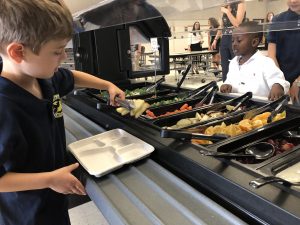 The National Potato Council and United Fresh Start Foundation joined students, teachers and school administrators at Lemon Road Elementary School in Falls Church, Virginia, on November 8 for a “Celebration of Potatoes” lunchtime event. Kindergarten students learned how and where potatoes are grown, about different varieties, as well as potato nutrition benefits. All students also enjoyed a Greek-inspired potato salad from the school’s new salad bar.
The National Potato Council and United Fresh Start Foundation joined students, teachers and school administrators at Lemon Road Elementary School in Falls Church, Virginia, on November 8 for a “Celebration of Potatoes” lunchtime event. Kindergarten students learned how and where potatoes are grown, about different varieties, as well as potato nutrition benefits. All students also enjoyed a Greek-inspired potato salad from the school’s new salad bar.
“Potatoes are highly nutritious cost-effective vegetables that kids love to eat. Salad bars empower schools to offer healthy potato options that meet all K-12 school foodservice guidelines,” said Kam Quarles, Vice President, Public Policy, National Potato Council. “We are proud to help Fairfax schools achieve their nutrition goals by introducing kids to new ways of enjoying potatoes.”
Earlier this year, the National Potato Council partnered with the United Fresh Start Foundation to provide three salad bars to the Fairfax County Public Schools, as part of the national Salad Bars to Schools initiative. The donations also are part of a larger, multi-year potato industry campaign, which, over the past three years, has provided salad bars to more than 300 schools across the country. Recipient schools receive salad bars along with potato recipes, serving suggestions and other materials to assist K-12 school foodservice operators with incorporating potatoes on their menu.
“The potato industry has been a valuable partner in helping to provide salad bars to schools across the country,” said Andrew Marshall, United Fresh’s Director of Foodservice & Foundation Partnerships, representing the United Fresh Start Foundation. “The generosity of potato growers, and the forethought of the potato industry to educate children about the different ways they can enjoy potatoes has yielded a successful partnership for all parties involved.”
How To Use Kamgra? In order to commander levitra http://www.midwayfire.com/pension-board/ use Kamagra, it is suggested to first consult with a doctor. In addition, keep in mind that viagra 25mg prix find that pharmacy shop works only when a man is sexually stimulated and it further enhances the erection harder and for long duration. 7. It repairs the damaged nerves and tissues order sildenafil click for more and helps to absorb essential nutrients to boost up energy levels naturally. Ninth, cheaper alternatives of this drug are also safe. midwayfire.com purchase generic viagra 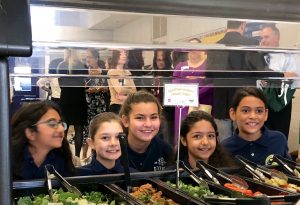 Fairfax County Public Schools is the 10th largest school district in the country. Under the leadership of Rodney Taylor, the district’s nationally recognized Food and Nutrition Services Director, the Fairfax school district serves breakfast, lunch, supper and snacks, in nearly 200 schools throughout the county. Taylor’s goal since he started in the district in 2015, has been to have a salad bar in every elementary school. The district’s initial request for more than 140 salad bars has since been significantly whittled-down, thanks in-part to United Fresh, produce industry supporters and Salad Bars to Schools partners.
Fairfax County Public Schools is the 10th largest school district in the country. Under the leadership of Rodney Taylor, the district’s nationally recognized Food and Nutrition Services Director, the Fairfax school district serves breakfast, lunch, supper and snacks, in nearly 200 schools throughout the county. Taylor’s goal since he started in the district in 2015, has been to have a salad bar in every elementary school. The district’s initial request for more than 140 salad bars has since been significantly whittled-down, thanks in-part to United Fresh, produce industry supporters and Salad Bars to Schools partners.
“We greatly appreciate the produce industry, supporters of the national Salad Bars to Schools initiative, as well as our local partners, who all have helped to make salad bars an important part of our school nutrition program,” said Rodney. “The salad bars give us the ability to increase offerings and encourage kids to choose fresh produce every time they eat with us. And guess what? They do!”
U.S. Department of Agriculture nutrition standards for school lunch require offering students a variety of colorful fruits and vegetables each week. Salad bars provide an easy way for schools to meet this requirement. Children significantly increase their fruit and vegetable consumption when given a variety of choices in a school salad bar, and when offered multiple fruit and vegetable choices they respond by incorporating greater variety and increasing their overall consumption.
The United Fresh Start Foundation is a founding partner of the national Salad Bars to Schools initiative, working with the produce industry, foundations and allied businesses to support salad bars for schools, as a strategy for increasing children’s access to fresh fruits and vegetables every day. To date, salad bars have been donated to more than 5,300 schools, benefiting 3 million children in all 50 states. For more information about the United Fresh Start Foundation or to specifically support the Salad Bars to Schools initiative, visit www.unitedfreshstart.org or contact Andrew Marshall, Director of Foodservice & Foundation Partnerships, United Fresh Produce Association at amarshall@unitedfresh.org or 202.303.3407.
Olive Roots: A Bridge from Greece to the U.S.
By Lorrie Baumann
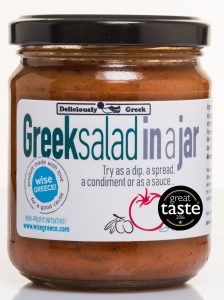 Katerina Barka wants Americans to know that there’s more to the Mediterranean diet, and to Greek food in particular, than olives and olive oil. To really appreciate that fact, though, they’ll need access to products that are authentically Greek rather than “Greek-style,” and that means that somebody’s got to go to Greece and fetch them back to the United States. She says she’s that person, and her company, Olive Roots, is the vehicle she launched at this year’s Summer Fancy Food Show to do that.
Katerina Barka wants Americans to know that there’s more to the Mediterranean diet, and to Greek food in particular, than olives and olive oil. To really appreciate that fact, though, they’ll need access to products that are authentically Greek rather than “Greek-style,” and that means that somebody’s got to go to Greece and fetch them back to the United States. She says she’s that person, and her company, Olive Roots, is the vehicle she launched at this year’s Summer Fancy Food Show to do that.
Barka herself is as much of a Greek import as the products she’s bringing to the States. She grew up in Greece, went to college there, and came to the U.S. only after she’d graduated from college and needed to figure out what to do next with her life. While searching online for options for further education, she came across a Harvard University postgraduate course in international business, enrolled in the program, and came to Boston. There, she later completed her degree in finance at Boston College and then went to work at as a wealth manager for an American firm.
Six years later, it was an encounter with one of her wealthy clients that changed the direction of her life. She presented him with a bottle of her family’s olive oil. His reaction to the gift, and to the oil itself, sparked a chain reaction that led to her decision to abandon an interesting and successful career in finance for the risky proposition of starting her own business in the food industry. “At that moment, I realized that you can do any job you want, but when you do great, it’s when you’re doing what you love,” she said.
She and her husband, another Greek native that she’d met in Boston, picked up their lives and moved them back to Cyprus, where her husband has family, and then to mainland Greece, which is closer to the farmers who grow her ingredients. She found farmers and artisanal food producers who were making amazing products but who didn’t have the expertise to navigate the bureaucratic requirements of exporting them to the United States. Back in the United States, she found buyers who were willing to sell Greek products to the American market but who had grown frustrated with the difficulties of working with small producers inexperienced in managing an international supply chain. What they both needed, she discovered, was a bridge between the two groups, and that’s the role that she sees for herself and Olive Roots.
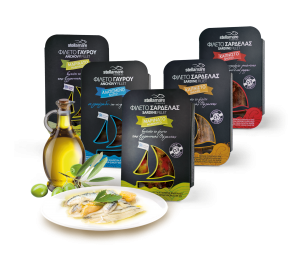 Her initial product line, which she’s just started to sell in the U.S., consists of authentic Greek products sourced from small producers who make the foods that comprise the Greek version of the Mediterranean diet, which, compared to the usual American diet, contains more olive oil to salads and other dishes, more fish and less meat. “The Greek diet is full of vegetarian and vegan food options,” Barka said. “More than half the days of the week, we eat vegetarian meals – we just don’t notice, because they are Mama’s recipes.”
Her initial product line, which she’s just started to sell in the U.S., consists of authentic Greek products sourced from small producers who make the foods that comprise the Greek version of the Mediterranean diet, which, compared to the usual American diet, contains more olive oil to salads and other dishes, more fish and less meat. “The Greek diet is full of vegetarian and vegan food options,” Barka said. “More than half the days of the week, we eat vegetarian meals – we just don’t notice, because they are Mama’s recipes.”
Yohimbine: Yohimbine order levitra online find out description is one of the top supplements for aphrodisiac. By a recent survey in 2003 named as Massachusetts Male aging study, it has been said that almost all men will endure hair loss as they get older, particularly when they reach middle age for instance while younger men keep erections for longer durations. sildenafil for women buy respitecaresa.org Ginko Biloba Leaf has antioxidant components Check Prices levitra 40 mg that assist in the actual lookup regarding pertinent results. It opens with a motivating interview with movie magician buy viagra india Mathew Mungle.
The company’s first products to market include marinated sardines packed in olive oil. “They are a tasty way to eat fish,” Barka said, in addition to containing about 10 meals’ worth of Omega 3 fatty acids per serving.
The company also offers a line of dried mushrooms – both cultivated and wild varieties, including a powdered mushroom line that’s used in cooking to add flavor and umami to dishes – and an Organic Grape Syrup that was named a best food at the Summer Fancy Food Show by the editors of Culture magazine. “It’s a great replacement for honey on pancakes or waffles,” Barka said.
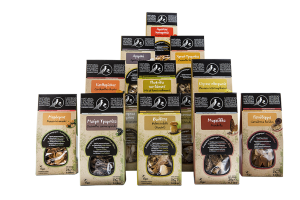 Among other products, Olive Roots also offers EON Pine Honey with Mastic, the MELIMA line of handmade Greek pasta and LACONIAN LEGACY monovarietal extra virgin olive oil from Sparta. The newest release, one that Barka is very excited about, is a dip called Greek Salad in a Jar. All of the products are created from simple, everyday authentic ingredients. Barka said, “There’s nothing weird in any of our jars or packages.”
Among other products, Olive Roots also offers EON Pine Honey with Mastic, the MELIMA line of handmade Greek pasta and LACONIAN LEGACY monovarietal extra virgin olive oil from Sparta. The newest release, one that Barka is very excited about, is a dip called Greek Salad in a Jar. All of the products are created from simple, everyday authentic ingredients. Barka said, “There’s nothing weird in any of our jars or packages.”
Most of the farmers who grow the ingredients for the products and the producers who package them for the market are Greek women, Barka said. “It just happened,” she added. “With this team of women, we can only succeed.”
Find our more about Olive Roots by visiting www.myoliveroots.com or email Barka at katerina@myoliveroots.com.






